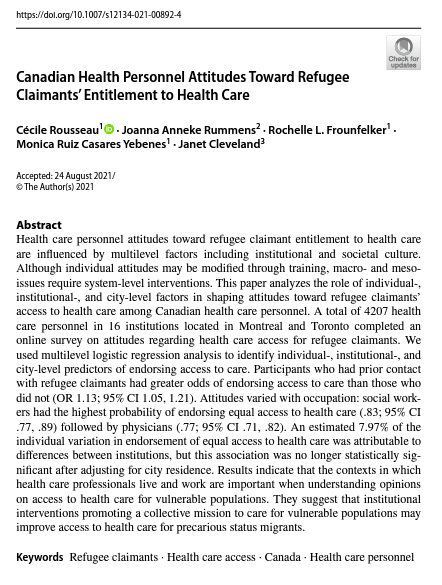Canadian Health Personnel Attitudes Toward Refugee Claimants’ Entitlement to Health Care
Abstract
Health care personnel attitudes toward refugee claimant entitlement to health care are influenced by multilevel factors including institutional and societal culture. Although individual attitudes may be modified through training, macro- and meso-issues require system-level interventions. This paper analyzes the role of individual-, institutional-, and city-level factors in shaping attitudes toward refugee claimants’ access to health care among Canadian health care personnel. A total of 4207 health care personnel in 16 institutions located in Montreal and Toronto completed an online survey on attitudes regarding health care access for refugee claimants. We used multilevel logistic regression analysis to identify individual-, institutional-, and city-level predictors of endorsing access to care. Participants who had prior contact with refugee claimants had greater odds of endorsing access to care than those who did not (OR 1.13; 95% CI 1.05, 1.21). Attitudes varied with occupation: social workers had the highest probability of endorsing equal access to health care (.83; 95% CI .77, .89) followed by physicians (.77; 95% CI .71, .82). An estimated 7.97% of the individual variation in endorsement of equal access to health care was attributable to differences between institutions, but this association was no longer statistically significant after adjusting for city residence. Results indicate that the contexts in which health care professionals live and work are important when understanding opinions on access to health care for vulnerable populations. They suggest that institutional interventions promoting a collective mission to care for vulnerable populations may improve access to health care for precarious status migrants.

